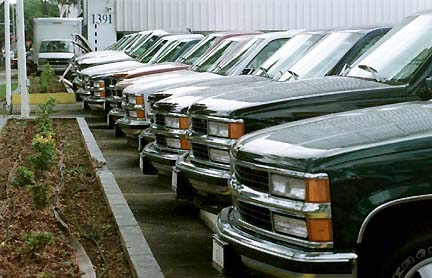
![]()
Think Inc.
A forum for Hawaii's
business community to discuss
current events and issues.

![]()
Think Inc.
A forum for Hawaii's
business community to discuss
current events and issues.
Communication breakdown | Lease or buy?
|
 |
Communication Adaptive leaders need to be able to think and act beyond the cultural traps of their own beliefs and values. This requires cultural competency, or the ability to effectively work within a variety of culturally-defined ways for getting things done. Even fundamental concepts such as productivity are designed around culturally-influenced values and expectations.
breakdown
Cultural view can get in the way
of getting the job doneBy Jerry Glover and Gordon Jones
Consider the frustrations of a university-trained expatriate from England who attended a management workshop we conducted in Fiji. The expatriate was new to Fiji and had been quite vocal in expressing his difficulty with the "work ethics" of Fijian villagers.
As the day progressed, his story became clearer to us. During his first week in Fiji, he had requested that a local village chief send "three men to do an eight-hour job of clearing a field." Each of the three men was to be paid an hourly wage.
Early the next morning, the entire group of able-bodied men from the village showed up to do the work. The expatriate, reasoning that he didn't need the 40 of them, explained to us, "I asked the chief to select three men to do the work. Then I asked the rest to go back to the village."
The chief responded that if all 40 men cleared the field, they could complete the work in one or two hours, then go back to the village to do other work. Further, the chief requested that the men not be paid individually. He explained to the expatriate that he would take the money for all of the workers and put it in the village fund, a traditional communal means for equally distributing money.
The expatriate then proudly told us that he sent the chief and villagers away, only to later pay higher wages to three Fijian Indian contract workers he transported from a nearby city. The process of 40 men doing the work of three men, in one hour instead of during an eight-hour day, had perplexed him. He also did not understand the purpose of the village fund. He summarized his story by commenting on the work ethic of Fijians, saying, "They are not motivated to be productive. They don't seem to have any individual initiative!"
This simple case illustrates the clash of very different cultural models of productivity. Each man had responded to the situation from his culturally conditioned view of productivity. The expatriate was guided by his cultural orientation based on the principles of so-called "scientific management." His approach to the job of clearing the field and organizing workers revealed his Western orientation to productivity. Thus, the expatriate manager was unable to think beyond his culturally prescribed model of productivity. His concern with time and labor scheduling actually cost him money and time in the end, as he had to wait several days to import from the city workers who shared his cultural prescription for productivity. His strongly-held beliefs about productivity prevented him from seeing the possibilities of adapting to his new environment. The expatriate was caught in a cultural trap of his own doing.
The chief, on the other hand, did not care about time and motion assumptions of the expatriate but, instead, saw an opportunity to get the work done as quickly as possible, using a collective work group. Outside revenue was needed as the villagers were attempting to participate in the nation's economic development initiatives. But, the expatriate's reaction to the chief's proposal made him view future requests from the expatriate with suspicion. There was even talk among the elders of rethinking the terms of the land lease, since the land occupied by the expatriate was owned by the village.
Certainly the expatriate would have been more effective in getting the field cleared if he had been more sensitive to the cultural context of his decisions. The cultural values influencing his decision-making were not aligned nor adaptive within the context in which he was operating. Although, in the short-term, he got the job done in a way that made sense to him, the larger problems he created in the process were clearly maladaptive.
Next week we will discuss effective acquisition and use of information.
Jerry Glover is a professor of organizational change a Hawaii Pacific University. Gordon Jones is a professor of management information systems at HPU. They can be reached at JerryGlover@compuserve.com and gjones@hpu.edu. BACK TO TOP
|

|
Need a new car or truck? You probably want some answers about leasing vs. purchasing a new vehicle. Listen to the advice of a professional. Unless you use your
vehicle for business,
don't consider leasingBy Michael Ottoson
After 17 years in the automobile rental, leasing and sales business in Honolulu, I would like to share some valuable tips with you to consider when you need a new car.
Automobile leasing was created for the commercial customer -- the individual who uses his car for business purposes, and who can take a tax write-off for the use of his vehicle.
If you do not use your vehicle for business, forget about leasing. You will pay more interest during the lease period than with regular automobile financing, and you may have to pay more than the depreciated cost for the vehicle at lease maturity, if you want to own the car at the end of the lease.
However, if you do use the vehicle for business purposes, either for your business or while doing a lot of driving on the job, leasing may be for you. Consider some of these benefits of leasing:
>> There is no down payment. Usually your first month's lease payment and a small security deposit are due at inception, plus license and registration fees.This is especially comforting to the commercial user who may need several company vehicles of different makes and models, and wants to deal with only one leasing agent, instead of a different salesman from each dealership.>> You can normally write-off the portion of your monthly lease payment that is attributable to business use.
>> Monthly lease payments are normally lower than payments on a car loan.
>> If you don't want to own the vehicle at lease maturity, you can normally "walk away," provided you are within certain mileage limits and normal wear and tear guidelines.
>> As opposed to a dealer, who can only sell or lease his own product, a pure leasing company can usually lease you any make or model of new car or truck.
One possible drawback is a customer typically must have better credit to lease than to purchase a vehicle, due to the lack of a down payment.
Purchasing a vehicle is definitely the only way to go if you don't use your vehicle for business, or if your favorite dealership salesman already gives you the best price in town.
Also, when you purchase your automobile, you have the choice to seek financing at your credit union or other banking source, which may give you a lower rate for being a preferred customer.
However, many dealers are still offering free factory financing as an incentive to buy their product
These deals are usually more prevalent with domestic manufacturers, however, so if you are looking for a popular imported model, you may have to shop for your own financing.
Military buyers who expect to be transferred to a new place of duty during the term of their financing contract should first ask the lender if the financed vehicle may be shipped to their next place of duty.
Michael Ottoson was in the automobile rental and leasing business in Honolulu for 17 years.
To participate in the Think Inc. discussion, e-mail your comments to business@starbulletin.com; fax them to 529-4750; or mail them to Think Inc., Honolulu Star-Bulletin, 7 Waterfront Plaza, Suite 210, 500 Ala Moana, Honolulu, Hawaii 96813. Anonymous submissions will be discarded.